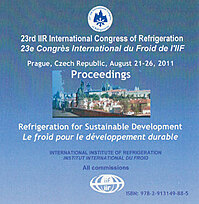
Summary
The flow boiling heat transfer coefficients of pure CO2 and CO2-oil mixtures inside a micro-fin copper tube were measured at saturation temperatures of 0 and 10°C using electrical resistance method. The micro-fin tube is 5.43 mm in mean inner diameter and is heated using a film heater. In the case of pure CO2, the results showed that the flow boiling heat transfer coefficients at the saturation temperature of 10°C are slightly higher than those of 0°C. The flow boiling heat transfer coefficients increase with the increase in heat flux, but are almost independent of mass velocity. These results imply that the flow boiling heat transfer in the case of pure CO2 is dominated by nucleate boiling. In the case of CO2-oil mixtures, the heat transfer coefficients depend on mass velocity, but are independent of heat flux. So the flow boiling heat transfer is considered to be dominated by forced convective evaporation. From the flow visualization results, the foaming phenomenon was not observed, but it is found that an oil film was formed on the inner wall surface, and a lot of oil droplets are observed in the liquid phase of the refrigerant.
Available documents
Format PDF
Pages: 8 p.
Available
Public price
20 €
Member price*
Free
* Best rate depending on membership category (see the detailed benefits of individual and corporate memberships).
Details
- Original title: Measurement of flow boiling heat transfer coefficient of CO2-oil mixtures inside a copper micro-fin tube using electrical resistance method.
- Record ID : 30002188
- Languages: English
- Source: Proceedings of the 23rd IIR International Congress of Refrigeration: Prague, Czech Republic, August 21-26, 2011. Overarching theme: Refrigeration for Sustainable Development.
- Publication date: 2011/08/21
Links
See other articles from the proceedings (569)
See the conference proceedings
Indexing
-
Investigations on the flow boiling heat transfe...
- Author(s) : WETZEL M., SAITO Y., KIND M., et al.
- Date : 2011/08/21
- Languages : English
- Source: Proceedings of the 23rd IIR International Congress of Refrigeration: Prague, Czech Republic, August 21-26, 2011. Overarching theme: Refrigeration for Sustainable Development.
- Formats : PDF
View record
-
Experiments on flow boiling characteristics of ...
- Author(s) : JIGE D., KIKUCHI S., EDA H., et al.
- Date : 2019/08/24
- Languages : English
- Source: Proceedings of the 25th IIR International Congress of Refrigeration: Montréal , Canada, August 24-30, 2019.
- Formats : PDF
View record
-
Model for prediction of flow boiling heat trans...
- Author(s) : LI M., DANG C., TANAKA S., et al.
- Date : 2010/06/07
- Languages : English
- Source: ACRA2010. Asian conference on refrigeration and air conditioning: Tokyo, Japan, June 7-9, 2010.
- Formats : PDF
View record
-
Effect of oil on heat transfer characteristics ...
- Author(s) : HU H. T., DING G. L., GAO Y. F., et al.
- Date : 2011/08/21
- Languages : English
- Source: Proceedings of the 23rd IIR International Congress of Refrigeration: Prague, Czech Republic, August 21-26, 2011. Overarching theme: Refrigeration for Sustainable Development.
- Formats : PDF
View record
-
Effect of oil on flow boiling heat transfer and...
- Author(s) : KIM S., HRNJAK P.
- Date : 2012/07/16
- Languages : English
- Source: 2012 Purdue Conferences. 14th International Refrigeration and Air-Conditioning Conference at Purdue.
- Formats : PDF
View record
